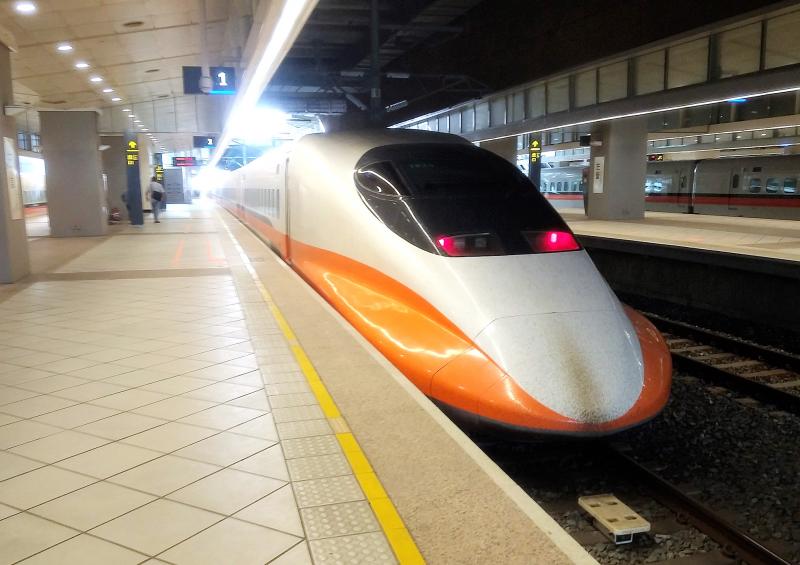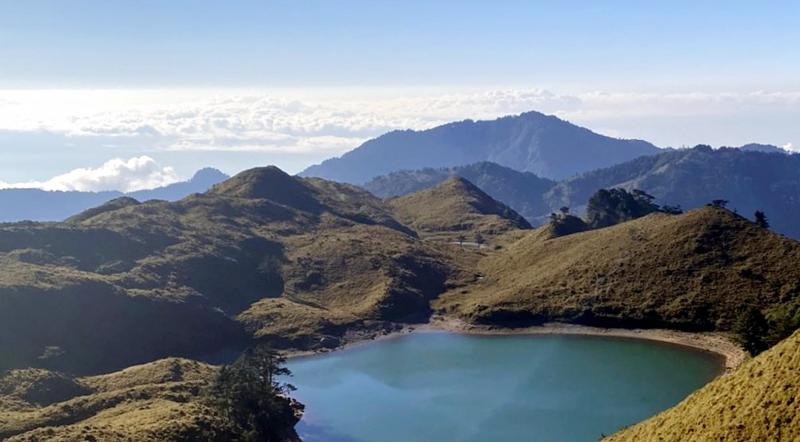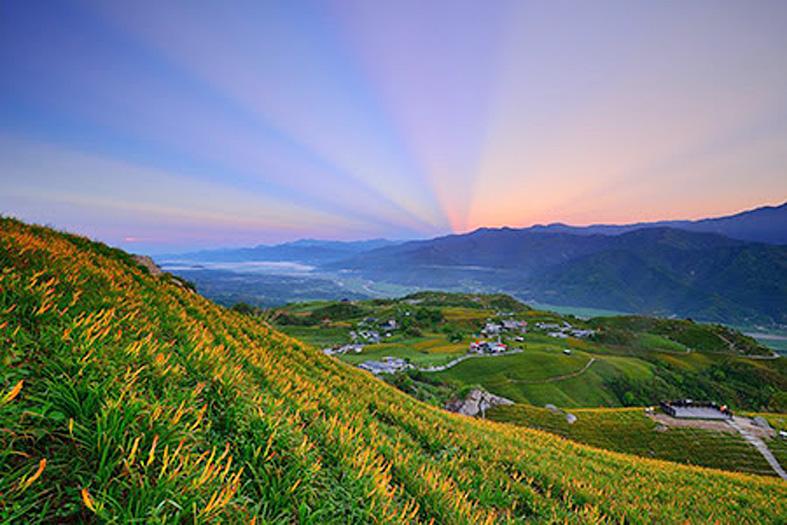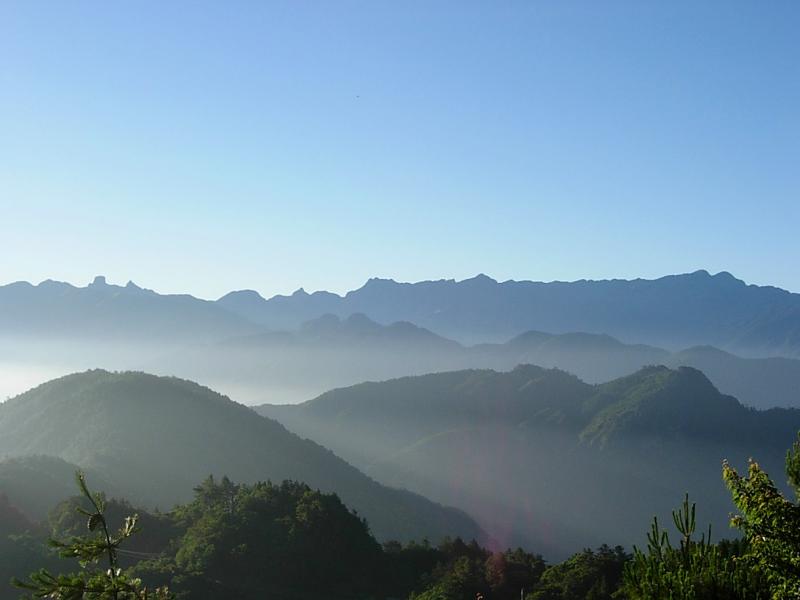This month the government floated plans to extend the High Speed Rail (HSR) network around the entire island. Transportation Minister Wang Kwo-tsai (王國材) said that this dream will be built piece by piece, due to its high construction costs.
At present plans are being formulated for an extension to Yilan, with the new HSR station slated for a site 350 meters south of the Yilan county government complex. The government has promised to put in a new train station there as well.
That project is paralleled by a proposal to spend billions to put in an express rail line to Yilan. The HSR extension piles on more billions — to the collective tune of NT$188 billion (US$6.7 billion). Bacon for everyone!

Photo: Hou Cheng-hsu, Taipei Times
If only Pingtung and Chiayi counties would put in place policies to become bedroom communities for Taipei, they too could get expensive development projects.
Preliminary work has also begun on the HSR extension between Zuoying Station in Kaohsiung and Liukuaicuo Station (六塊厝) in Pingtung County, at an estimated cost of NT$55.4 billion.
SERVING THE CONSTRUCTION-INDUSTRIAL STATE

Photo: Hsieh Chieh-yu, Taipei Times
The government is performing the environmental impact assessments on these two projects now. Note that verb, “performing:” projects are almost never killed by the EIA, and the Environmental Protection Agency (EPA) has long acted as the vanguard of the construction-industrial state.
The proposed line encircling Taiwan is an apt metaphor for the construction-industrial state’s grip on the nation’s politics: it is going to be a bonanza for local construction companies. It is not a coincidence that “invest” means to surround a fortress to prevent the enemy from escaping. Not a dollar will slip through their fingers.
The construction-industrial state may not have any candidates running, but it wins every election.

Photo courtesy of the Tourism Bureau
The Democratic Progressive Party (DPP) understands this well. One of the first programs of the administration of Tsai Ing-wen (蔡英文) was the 2017 passage of the light rail programs and other infrastructure under the rubric of the Forward-Looking Infrastructure Plan, a proposal for nearly NT$880 billion in spending over 8 years.
Some of the projects, such as the provisions for digital infrastructure and green energy, are likely useful. But as many commentators noted at the time, the program echoed the corrupt construction-industrial state model that has lathered concrete across Japan, South Korea, Taiwan and China, the real East Asian development model.
Instead of reforming this corrupt, destructive system, the party of the former democratic opposition is feeding and watering the local patronage networks with a cornucopia of construction projects.

Photo: Liao Hsueh-ju, Taipei Times
An HSR down to Hualien and beyond augurs massive investments in bridging and tunneling, and expensive earthquake-proofing for that unstable area, along with immense environmental destruction. But who cares? It’s bacon for everyone!
Further south, where will it go? Recapitulating the existing train line through the Rift Valley with consequent farmland expropriation? Or pioneering down the coast to the underserved communities there? Either way it will likely plow through one indigenous community after another, leaving a trail of broken promises and angered locals in its wake. The mind boggles, or rather, boondoggles.
Similarly, like many, this writer is curious what route the proposed HSR will take to Kenting. Anyone who has driven to Kenting has seen how cramped the coastal shelf is, especially south of Fenggang (楓港). Will they ram tunnels through the mountains instead?
FORGOTTEN PROMISES
How will this play out? We’ve seen it again and again. The government will make promises about services and land use when it expropriates the land, explaining that the land will become parks and other public facilities. When the plans become concrete, though, those promises are forgotten.
When the government put the railway underground in Tainan, it promised local families whose land was being expropriated that it would be used for parks. Sure enough, when the plans for the land were finally revealed, it was largely zoned as commercial land for retail shops, a sterling example of that special neoliberal development alchemy by which public assets are turned into private gold.
This will be followed by protests when the promises are broken, which the government will first attempt to placate and then finally ignore. When the plans for the elevated railways were revealed, locals in Taichung protested that their commuting times would increase, since they could no longer run from the street directly onto the train. Nobody in power listened, of course. Because, well, bacon.
One has to wonder what the wave of land expropriations in the coming years will do to local politics. Prior to the student-led Sunflower movement, Taiwan’s youth had cut their teeth on protests over land seizures. Will another generation be energized, seeing the DPP as a party of cynical neoliberal hacks? Many already do.
Think of what the NT$55.4 billion spent on the (completely unnecessary) HSR extension to Pingtung would buy.
It could support massive investments in solar and wind and closures of our murderous fossil fuel plants, in clean water projects, in clinics and schools for mountain communities, in biotech and Internet of Things, in Javelins and Stingers and Harpoons for defense, or any of dozens of other urgent needs.
These are far more important than a glamor project to draw a line around the island with high speed train lines, an echo of another Ministry of Transportation and Communications project to connect the roads along the entire coastline.
Apparently, the image of a Taiwan encircled by neat lines on the map has a tight grip on the official imagination. Taipei-centric, it almost feels like officialdom cannot imagine riding down the coast in an ordinary express train with the hoi polloi. It must have an HSR.
In Taitung the average salary is less than NT$30,000 a month. If the government really sought to serve its people, it would be putting in more low-cost express train lines. Or it could spend the money on a real need, like water infrastructure for the increasingly dry east coast.
The construction-industrial state’s control of Taiwan’s politics is destroying Taiwan, covering its farms with concrete, blowing tunnels through its fragile mountain ecosystems, scouring its rivers of gravel and diverting its public funds to private pockets in the service of party politics. It is warping its democracy with money politics, like a ray of light being sucked into black hole.
Indeed, at the press conference, Wang mentioned the corporatization of Taiwan Railways, a project driven in part by the desire of local developers to acquire the large land holdings of the government railway. Bacon for everyone!
At a press conference in 2019, Minister Without Portfolio Wu Tze-cheng (吳澤成) observed that “the traffic inside the Hsuehshan Tunnel on the Chiang Wei-Shui Freeway [Freeway No. 5] during long weekends or major national holidays is indeed a nightmare. It would only get worse once the Suhua Highway Improvement Project is completed.”
One development project leads to another, which in turn creates demand for a new project. Construction-industrial state spending is an opiate, requiring ever greater doses to get the same effect.
Nietszche was wrong. That which kills us does not make us stronger.
Instead, it just makes us co-dependent.
Notes from Central Taiwan is a column written by long-term resident Michael Turton, who provides incisive commentary informed by three decades of living in and writing about his adoptive country. The views expressed here are his own.

April 14 to April 20 In March 1947, Sising Katadrepan urged the government to drop the “high mountain people” (高山族) designation for Indigenous Taiwanese and refer to them as “Taiwan people” (台灣族). He considered the term derogatory, arguing that it made them sound like animals. The Taiwan Provincial Government agreed to stop using the term, stating that Indigenous Taiwanese suffered all sorts of discrimination and oppression under the Japanese and were forced to live in the mountains as outsiders to society. Now, under the new regime, they would be seen as equals, thus they should be henceforth

Last week, the the National Immigration Agency (NIA) told the legislature that more than 10,000 naturalized Taiwanese citizens from the People’s Republic of China (PRC) risked having their citizenship revoked if they failed to provide proof that they had renounced their Chinese household registration within the next three months. Renunciation is required under the Act Governing Relations Between the People of the Taiwan Area and the Mainland Area (臺灣地區與大陸地區人民關係條例), as amended in 2004, though it was only a legal requirement after 2000. Prior to that, it had been only an administrative requirement since the Nationality Act (國籍法) was established in

With over 80 works on display, this is Louise Bourgeois’ first solo show in Taiwan. Visitors are invited to traverse her world of love and hate, vengeance and acceptance, trauma and reconciliation. Dominating the entrance, the nine-foot-tall Crouching Spider (2003) greets visitors. The creature looms behind the glass facade, symbolic protector and gatekeeper to the intimate journey ahead. Bourgeois, best known for her giant spider sculptures, is one of the most influential artist of the twentieth century. Blending vulnerability and defiance through themes of sexuality, trauma and identity, her work reshaped the landscape of contemporary art with fearless honesty. “People are influenced by

The remains of this Japanese-era trail designed to protect the camphor industry make for a scenic day-hike, a fascinating overnight hike or a challenging multi-day adventure Maolin District (茂林) in Kaohsiung is well known for beautiful roadside scenery, waterfalls, the annual butterfly migration and indigenous culture. A lesser known but worthwhile destination here lies along the very top of the valley: the Liugui Security Path (六龜警備道). This relic of the Japanese era once isolated the Maolin valley from the outside world but now serves to draw tourists in. The path originally ran for about 50km, but not all of this trail is still easily walkable. The nicest section for a simple day hike is the heavily trafficked southern section above Maolin and Wanshan (萬山) villages. Remains of